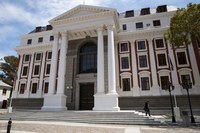Impressions of Parliament
“The meeting was held in the NCOP building in one of the smaller committee rooms. The venue was clearly too small for all the people who attended. The police briefed MPs on the anti-gang strategy and representatives from community organisations were also present. People were standing outside as it was packed inside and very hot. Some MPs complained about the venue and the committee secretary explained she tried to get another venue, but none were available. People were sitting on the floor and people were sweating inside. One had to be careful to not step on people sitting on the floor. It is also difficult to see from the floor who is presenting so one does not know who is speaking. It was also difficult to hear the presenters. There were no documents for the public. People were also constantly moving in and out during the meeting due to the heat and stuffiness inside. At first, I thought it was a waste of time, but I stayed because the minister was there without his bodyguards. So, there can sometimes be some value in smaller venues because one can get close to a minister.”
Access to Parliament is more than just making it through the gates. It often relates to how accessible documents are during meetings, whether adequate and accurate notice is given of meetings and venues and the physical attributes of these venues. In this case the physical constraints of the venue clearly undermined the value of public participation in this meeting. The committee did however, score points for responsiveness to the public. During the meeting community organisations and other stakeholders were given an opportunity to give input on the anti-gang units – a very controversial issue for communities on the Cape Flats.
A Note on Parliament Watch
*Parliament Watch is a is a collective of nine independent organisations working towards the advancement of social justice, the realisation of human rights, and strong constitutional democracy in South Africa. Collaborators include the Dullah Omar Institute, UWC (DOI); Equal Education Law Centre (EELC); Heinrich Boell Foundation (HBF); Livity Africa (LA); Parliamentary Monitoring Group (PMG); Public Service Accountability Monitor (PSAM); The Right to Know Campaign (R2K); Social Justice Coalition (SJC); and Women on Farms Project (WFP). A diverse range of individuals from the participating organisations participates in the project as monitors in Parliament. Some of these monitors have extensive experience in actively engaging with committees in the legislatures on both law reform and oversight while others had very little exposure to Parliament, if any.
This week's articles
Glitches in online system adding to NPOs’ woes

